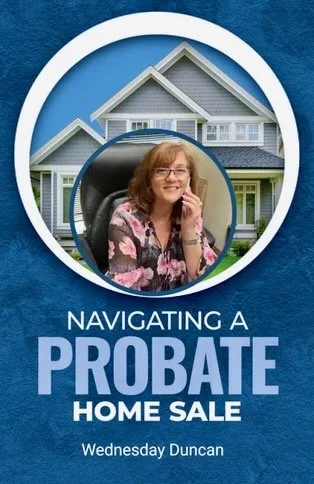Do you need a Probate REALTOR®?
When a homeowner dies without a will, it often results in a lengthy legal process called probate.
If you are buying or selling a home in probate there can be a lot of differences from a standard sale.
Why a REALTOR®? Because we are official members of the National Association of REALTORS® who agree to abide by the Code of Ethics & Standards of Practice, ensuring that we serve your best interests.
How can I help? Give me a call: Wednesday Duncan 909.559.0618
Why a Certified Probate Real Estate Specialist? Because we have specific training on the probate process. This combined with our real world experience puts us in the best position to help you.
I chose to obtain this certification after my son suddenly became involved in the process. It was clear that I needed more than my 15 years of standard real estate practice to really be of help to him.
When you are the personal representative in the probate process you are acting in the interest of your loved one’s estate. You must follow the state probate laws and any potential directives from the probate court when setting the price and often the time line.
Lets start with the basics
What does a Probate REALTOR® do and when do you need one?
A Certified Probate REALTOR® guides you through the probate process when you are the executor or personal representative of a loved one in the probate process.
This is critical if you will need to sell real estate, but it can also be very helpful even if you don’t have real estate to sell in the probate process.
Finding the best REALTOR® for your probate property.
You need a REALTOR® who has the specific training to guide you through the process. And just as importantly you need a REALTOR® who knows the housing market specific to the real estate you need to sale.
As a Certified Probate Real Estate Specialist (CPRES) I have been trained by the U.S. Probate Services and in order to obtain my certification I was required to pass a test that measures my ability to handle complex probate property sales procedures. Working with a CPRES REALTOR® is the best way to make sure that you are working with someone who understands the probate system.
I have inherited property, what do I do now?
Proper preparations can definitely simplify the process. That’s why getting the help of both your probate attorney and a Certified Probate REALTOR® puts you in the best position to successfully proceed through the process.
What do I need to know to sell a house in probate?
A lot and there it can very dramatically on the location of the property, your individual circumstances, your loved one’s situation, other family members involved, etc. That is where we come in to help you sort out what is most important and how to proceed.
Will selling as-is for cash speed up the probate process?
Unfortunately, more often than not the answer is, “No.” Simply put, the process can only go as fast as the courts can go. In most cases, the judicial approval process is long enough that the buyer has sufficient time to put together their financing.
That’s why it is so important to focus on your best interests and work with a wide range of buyers. Too often an effort moving faster can cost you money and not actually speed up the process. More often than not, its best to work with all of the potential buyers to get the best result for your and your loved ones.
The probate real estate sale process
For a real estate sale, the probate process can differ depending on whether the probate court granted you rights of independent administration or dependent administration. Here’s a brief look at how each process works:
The independent administration rights probate process
If you, as the executor, have been granted independent administration rights, the probate property sale proceeds in a similar way to a traditional property sale. You have the freedom to set the list price, list the property on your timeline, and accept an offer without interference from the probate court.
However, there still are probate-specific details that your agent needs to stay on top of, including:
Setting up the proper probate contracts
Listing the home as a probate property
Making disclosures specific to probate
If these details aren’t in order at your final probate hearing, the probate court judge likely won’t allow the estate to be closed. As a result, you may need to redo the paperwork and schedule a new hearing, causing the lengthy probate process — which sometimes takes a year or more — to drag on even longer.
The dependent administration rights probate process
If you’ve been granted dependent administration rights, the probate property sale may be lengthier and more complicated. In these cases, the probate court oversees the home sale through an additional hearing called the court confirmation hearing.
Before this hearing, the executor hires a probate real estate agent to list the house at a price that can’t be less than 90% of its fair market value, according to Stimmel Law. Once you receive and accept an offer, it must then be presented to the probate court for confirmation.
California and the overbid process
In many states, the probate judge does not automatically confirm the accepted offer at the confirmation hearing. Instead, the court may entertain higher offers from other buyers attending the hearing. Known as the overbid process in California, this procedure functions much like an auction, with the court accepting the best offer price before it confirms the sale.
Fortunately, many states have taken steps to streamline the probate process and to avoid complicated steps like the court confirmation hearing.
So far, 18 states have adopted the American Bar Association-approved Uniform Probate Code to simplify probate proceedings. Other states have streamlined the probate process on their own, including in California where they’ve enacted the Independent Administration of Estates Act (IAEA).
We are here for you when you are ready!
Give me a call: Wednesday Duncan 909.559.0618
Question: How much is my home worth?
Answer: What a qualified buyer is willing to pay for it.
As you probably know, that's not how most home sellers and many real estate agents determine "their" price for a home. Most people have an idea of what homes in their neighborhood were "listed" for. Most of them, don't actually know the price the home actually sold for. That is a critical difference.
I will give you a quick example. We had a house in one clients neighborhood sell for $361,000. The home had been put on the market for $384,900. That's a $23,900 difference! Our new client expected they would be able to sell their home for at least $384,900. When they learned that the neighbors house actually sold for nearly $24,000 less they were not happy. Fortunately for them, when I toured their home it was clearly in a lot better condition and they had completed a number of recent upgrades. Together we were able to determine that they could likely sell their home for the high $390’s!
That's why I ask you to focus on three main issues:
Price, presentation and performance.
Price - is always based on what homes in your area have actually sold for...never just the initial asking price.
Presentation - I help you to determine exactly what needs to be done in order to be ready to sell. No more and certainly no less. Together you and I keep what the buyer will think in mind.
Performance - I perform. Selling your property for the right price and in the right time frame is a lot more than planting a sign in the yard, putting it on the Multiple Listing Service and hoping (should I say praying?) that it sells.
If things don't go perfectly:
Usually things move right along from listing to final close, but they don't always. Even with the best of efforts things can happen. If they do that's when I step it up another notch and make sure that you are supported in every way possible.
Pricing - The Art of Getting Home Values Right:
A computer pricing algorithm does not know if your granite countertops were put in correctly or what lies beneath those new floorboards or if that third bedroom used to be a garage. It doesn’t know the new development changes in the neighborhood that are going to raise the values of the homes in your neighborhood.
To properly sell a house, I have spent my career learning about neighborhoods, zoning laws, rates of return on investment, and financing. There is no magic pill or home seller cheat sheet and you can’t just “Google” it. I can enter an online search for how to fly a jumbo jet, but I doubt seriously you would want to see me in the pilot’s seat on your next flight back east! Or anywhere else for that matter.
The real estate industry is about “real property,” but it’s also about the real human beings who buy and sell those properties. Every transaction has its own story; every seller has their own motivation; and every buyer has their own goals they wish to achieve.
As real estate professionals we spend our lives as mediators and educators, using our experience to help a successful outcome to occur. When negotiations get testy, we can be a much needed cooler head to prevent emotions, misunderstandings or hurt feelings from derailing a positive transaction.
Low-cost brokerage models and For Sale By Owner champions will often claim that by cutting out the real estate commission, you can see a higher net from a transaction. But they fail to mention that most buyers are savvy enough to discount their offer because it’s a For Sale By Owner! When you don't use a full service real estate professional you aren't going to get a full price offer and that's just for starters. The number of people (not serious buyers) who will take your time and tromp through your property goes up dramatically.
Concerned about honesty? A professionally licensed real estate agent is governed by the laws of both municipal and industry legislation, and when working with an agent in this agency capacity, we are bound by law to be honest and work in your best interest. We are also proud members of the National Association of Realtors® and have agreed to abide by their even higher level of standards and ethics.
Finally, working with a real estate agent is about time - your time. Properties sell faster when an agent is involved, saving you carrying costs, stress and the added workload of being your own real estate professional.
And according to research by the National Association of REALTORS® you are likely to end up with more money in your pocket at the end of the transaction by working with a real estate agent!




